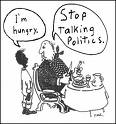Most of us know that the President of the United States has a cabinet, but exactly who is in this cabinet? And what do these people do? The United States Cabinet is comprised of the most senior appointed officers of the executive branch of the federal government. Each cabinet officer is nominated by the President and then confirmed by the Senate. After the President nominates a potential Cabinet member, the Senate takes a vote and decides, by a majority vote, whether to confirm or reject this nomination.
All Cabinet heads are referred to as “Secretary” except for the Attorney General. Today’s cabinet includes the Vice President and the heads of 15 executive departments. In addition, there are five other people who have cabinet ranks.
Interestingly, the Cabinet has been in existence since George Washington. Washington had a cabinet of four people including the Secretary of State, the Secretary of the Treasury, the Secretary of War and the Attorney General. Even today, these four titles are the four most important members of the President’s Cabinet.
The Cabinet is a very important part of the presidential line of succession. This line of succession, in order includes: Vice President, Speaker of the House of Representatives, President Pro Tempore of the Senate, Secretary of State, Secretary of the Treasury, Secretary of Defense, Attorney General, Secretary of the Interior, and so on. The government tries to make sure not to have all of these people in the same place so that the succession can run smoothly, should something terrible happen.
 Even if you are the kind of person who sees yourself as totally apolitical, on some level, you are involved in politics, whether you like it or not. Of course, we’re talking here of politics with a small p. That can cover anything from where you buy your fruit to how you feel about God or the lack thereof of an omnipresent being. You don’t have to be an expert on Obama – or even have an opinion on the guy – to be political. At least, that is the case with small p politics.
Even if you are the kind of person who sees yourself as totally apolitical, on some level, you are involved in politics, whether you like it or not. Of course, we’re talking here of politics with a small p. That can cover anything from where you buy your fruit to how you feel about God or the lack thereof of an omnipresent being. You don’t have to be an expert on Obama – or even have an opinion on the guy – to be political. At least, that is the case with small p politics.